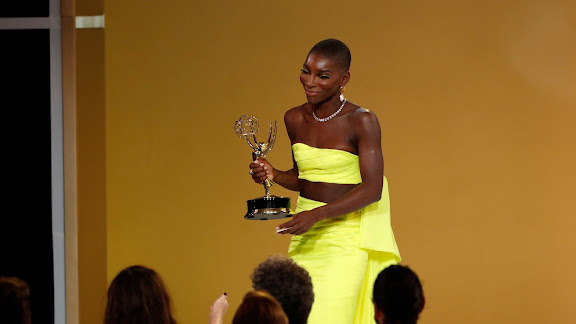 |
| Michael Coel Photo by Cliff Lipson |
The Quietest Emmys Speech Was the Loudest
After winning her award, Michaela Coel delivered the rare message meant for those outside the glitzy room in which she stood.
When the camera turned to Michaela Coel after she won an Emmy for limited-series writing, she looked overwhelmed. The creator, star, writer, and co-director of I May Destroy You kept her head down, her shoulders slouched. Next to her, Coel’s former co-star Cynthia Erivo whispered something into her ear—a pep talk, maybe. But for a few seconds, Coel remained still, as if the weight of her first, historic Emmy win might keep her from going onstage.
 |
| Michaela Coel |
Luckily, it didn’t. Coel gave one of the night’s shortest speeches, and perhaps its most revealing. In her remarks, Coel did something unusual: She thought about her audience, tried to reach beyond the other entertainers seated in the room with her. “Write the tale that scares you, that makes you feel uncertain, that isn’t comfortable,” she said. “I dare you … Visibility these days seems to somehow equate to success. Do not be afraid to disappear—from it, from us—for a while, and see what comes to you in the silence.” She spoke directly to the potential storytellers hoping to one day be onstage. And she didn’t just advise them; in a night of pomp and circumstance, she reminded them of the value of quieter triumphs.
Most awards-show speeches, at whatever length, don’t sound like this. They’re usually odes to the people who collaborated on the particular project being feted, with shout-outs to relatives and friends sprinkled in, and maybe a personal statement or two attached. This formula can work, but it can also highlight Hollywood’s solipsistic tendencies. See, for instance, last night’s speech from the writer-director Scott Frank, who won an Emmy for directing the limited series The Queen’s Gambit. In a long-winded attempt to thank what seemed to be everyone he’d ever worked with for the show, he ignored the exit music three times and scolded the Emmys’ producers for trying to play him off. The two speeches proved a stark contrast, and not just in length: Coel left an immediate impression, so much so that Olivia Colman, who won for lead actress in a drama a short while later, gave her a shout-out. Frank’s irritation at basic awards-show decorum and disregard for anyone beyond his own show’s colleagues made him the subject of online mockery.
Coel’s was the rare speech that understood what ceremonies such as the Emmys continue to overlook: what the audience at home truly wants to see. This year’s Emmys tried several glossy methods to improve ratings after the largely virtual 2020 Emmys failed to attract viewers. The 2021 format mimicked the Golden Globes, seating attendees at tables with food and drink. The show featured a host, Cedric the Entertainer, who starred in a handful of pre-taped sketches. It even had an opening number, and set up a separate party for the cast and crew of The Crown, in London, so they could tune in to the main event in downtown Los Angeles.
Yet for all of the Emmys’ efforts to attract eyeballs, the show still kept the audience at a remove. CBS, the network on which the awards aired, bleeped out profanity, making some speeches unclear. The show spoiled, during highlight clips, major plot reveals on Mare of Easttown and The Mandalorian—likely not an issue for the talent who worked on those series, but certainly a detriment to a casual TV watcher. And viewers never really learned whether the presenter Seth Rogen was joking when he complained that he’d been “lied to” about the ceremony being outdoors, and that, amid a pandemic, it was being held inside a “hermetically sealed tent” instead.
Coel, by contrast, invited the audience in. The artistry of her speech—in which she dedicated her award to “every single survivor of sexual assault”—came from her recognition that people would be watching, sinking ratings or not, and looking for something beyond GIF-able reaction shots and self-congratulatory acknowledgments. When the camera turned to her, she took a moment for herself, and then addressed those who needed to hear her the most.
Shirley Li is a staff writer at The Atlantic, where she covers culture.
THE ATLANTIC

No comments:
Post a Comment